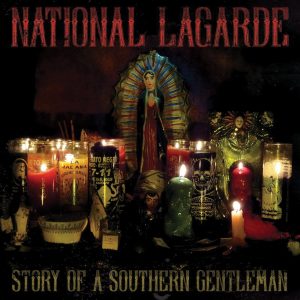 National Lagarde’s Story of a Southern Gentleman is a curious mixture of styles. Terry Lagarde’s description of his band on its Facebook page is not too far from the mark; he calls his “eccentric rock” a blend of “jazz, blues [and] flamenco/classical” that “all slam together in a rock format” with “story-telling vocals.” But there’s more to it than that. Right from the get-go, the surf rock influence is noticeable; the opening track is a transformation of Dick Dale’s iteration of “Miserlou.” But one also gets the sense on many of these tracks that they wouldn’t sound out of place as the soundtrack to a modern spaghetti western, epic in scope and tone with a dark, almost haunted feel. Although he doesn’t discuss it himself, his “story-telling” vocal style owes as much to country as it does to blues, and the impact of the composer of the album’s lone cover, Tom Waits’ “Goin’ Out West,” is palpable in the lyrics, through the sometimes rough vocals and the songwriting method throughout. His raw, dark, unrefined vocal-lyrical style, however, is just half the focus of the record.
National Lagarde’s Story of a Southern Gentleman is a curious mixture of styles. Terry Lagarde’s description of his band on its Facebook page is not too far from the mark; he calls his “eccentric rock” a blend of “jazz, blues [and] flamenco/classical” that “all slam together in a rock format” with “story-telling vocals.” But there’s more to it than that. Right from the get-go, the surf rock influence is noticeable; the opening track is a transformation of Dick Dale’s iteration of “Miserlou.” But one also gets the sense on many of these tracks that they wouldn’t sound out of place as the soundtrack to a modern spaghetti western, epic in scope and tone with a dark, almost haunted feel. Although he doesn’t discuss it himself, his “story-telling” vocal style owes as much to country as it does to blues, and the impact of the composer of the album’s lone cover, Tom Waits’ “Goin’ Out West,” is palpable in the lyrics, through the sometimes rough vocals and the songwriting method throughout. His raw, dark, unrefined vocal-lyrical style, however, is just half the focus of the record.
Ghostly Clint Eastwood aside, the other prominent feature is Terry’s shred guitar, as one might expect from a teacher of the instrument. Some of the comparisons are obvious: a dash of Jimi Hendrix and Jimmy Page, a splash of Metallica’s Kirk Hammett and Alice in Chains’ Jerry Cantrell. Perhaps even some Rage Against the Machine and Tool in the riff approach. But that’s overly reductive, as Terry’s skill on the acoustic and propensity to end his solos in a timely fashion differ from these pioneers of various styles in the lineage of hard rock.
There are a few odd stylistic choices, like inclusion of some abrupt piano and synthesizer passages, a track with an unusual rhythmic pattern that perhaps doesn’t flow as easily as it could, some borderline doo-wop/bubble gum pop vocal harmonies, and a single dissonant trumpet fill. And Terry’s unusual vocal and songwriting style is not for everyone. But these definitely lend some idiosyncratic charm to the record, and I’ve never heard anything quite like it. For those looking for a different take on hard rock with a distinctly Louisiana flavor to it, ending as it does with a delightfully innuendo-laden country hidden track about “mowing your grass,” this is as good a place to start as any.




